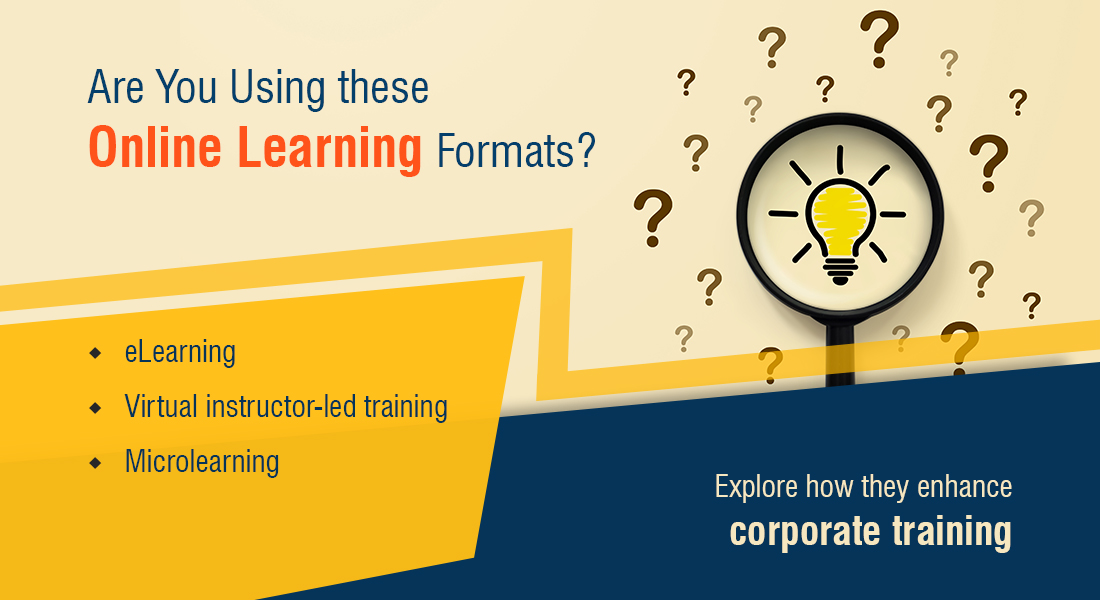Top 5 In-Person and Online Corporate Training Formats for The Modern Workforce

Whether it’s the work culture or the training sessions, the corporate world is extensively dynamic. The employees are advised to go through multiple formats of training to keep up with the workload and the technological advancements affecting their work. To make training engaging and productive, organizations often practice different training formats to meet their business goals and retain their employees. There are mainly 2 major ways to conduct corporate training sessions, online and in-person, which are further divided into various formats to facilitate versatility and engagement throughout their training programs.
Are Your Employees Finding it Hard To Engage Themselves In Your Corporate Training?
Here are a few training formats that might build their interest again-
- Workshops
- Microlearning
- eLearning courses
- Virtual Instructor-led Training
Read on to explore more corporate training formats that might be helpful for you.
In-Person Corporate Training Formats
1. Classroom training
This type of training is usually held within a separate space that is either rented or bought as per the budget and availability. The motive of hosting classroom training sessions is to make employees learn about the theoretical narratives of various training aspects such as project management and customer service training. There are no outside distractions inside the classroom so employees can successfully retain whatever knowledge is shared by the instructor.
2. Field trips
They are organized by the companies to give their employee’s a reality check of different industries and how they deal with things. For example, manufacturing industries generate a lot of waste, and to deal with that toxic waste, dispose of it properly, or just minimize its usage, a lot of sustainability training along with theoretical knowledge is provided to the workers. Companies who either buy products manufactured in these industries can take their employees for a field visit and give them clear insights about things they are not aware of. Field trips can also help to strengthen the bond among employees as they will roam around together in a different environment and learn together.
3. On-the-job training
Unlike classroom training, on-the-job training sessions are held in the workplace itself. These are more focused on a practical understanding of various aspects such as the functioning of tools, machinery, or software. For example, the textile industry has a lot of tasks that require excessive precision and practical know-how, and to provide that, they prefer on-site training where senior and experienced employees train their juniors. They can either make them work on tools and machinery and produce products firsthand while monitoring them or display the basic process step by step, then have them work in real-time once they successfully perform the task properly without errors.
4. Seminars
Seminars are lectures provided by external professionals or senior employees. The purpose of a seminar is to address a specific topic and hold discussions around it, to either gain knowledge or voice their opinions. Employees who attend the seminar can also raise their questions and share their ideas to help the company. Leadership training, customer assistance, and sales training can be delivered through a seminar.
5. Workshops
While seminars work well to facilitate lectures and theoretical knowledge, workshops help the employees to gain detailed insights into the soft skills and technical knowledge required for their job, and how the processes take place practically. Employees attending the workshop can also interact with other people and share their experiences, and keep themselves updated with the latest industry trends. Aspects such as financial literacy, career development, and employee onboarding can be covered really well with the help of a workshop.
Online or Digital Corporate Training Formats
1. eLearning courses
The digital programs that are curated about a specific topic and delivered digitally on multiple modern devices such as smartphones and laptops are called eLearning courses. Nowadays, there are courses to learn anything and everything ranging from “how to use an operating system” to “ how to create an operating system”. Modern-day eLearning courses are so viable for all sorts of training because they follow strong instructional designs and adult learning principles to enhance the engagement of learners and help them retain most of the knowledge they gain.
Overcome your eLearning implementation obstacles through this free eBook.
2. Microlearning
When certain topics are divided into smaller and more specific sub-topics, delivered in the form of small bite-sized chunks of information, it’s called microlearning. Microlearning helps the learners beat the forgetting curve and retain most of the information they gain through the modules. Microlearning assets can be in various formats such as videos, audio, infographics, content slides, and podcasts. Microlearning is mostly essential for performance support like instant job aids and how-to-demos.
3. Virtual Instructor-led training
Similar to classroom training sessions, but everything’s virtual here. Training sessions are held on virtual video conferencing platforms such as zoom or teams, where an instructor and the learners can stay in their homes, and yet attend their regular training programs. With organizations choosing to focus more on a hybrid or a total remote workforce model because they are spread globally, VILT is one of the most influential strategies to deliver regular quality training to all employees in a cost-efficient manner.
4. Virtual events (Webinars, online workshops, podcasts)
With modern technological advancements, online training methodologies have explored their potential and all the conventional methods have been digitalized. Seminars into webinars, offline workshops into online workshops, group discussions and lectures into podcasts, etc. Virtual events are mainly conducted to cater to learners globally using the latest digital tools and platforms. When events are held virtually, they save a lot of time, management efforts, and organizing costs.
Mobile Learning and Social Media
Social media platforms like Facebook, Instagram, and LinkedIn have brought a new wave of digitalization into the corporate era. LinkedIn has even launched its separate eLearning subsidiary called LinkedIn Learning which can help you learn various skills and earn certifications for either your personal gains or to achieve professional goals. Employees can interact with each other virtually, host group learning sessions, share any sort of information, and help each other grow, collectively.
With the extensive use of mobile phones over any other device, because of their multiple benefits, social media platforms along with other training resources can be accessed remotely without any considerable hassle. Thus, mobile learning has shaped online training sessions toward a more personalized approach than ever and is preferred by organizations as one of their primary methods of delivering online training.
Parting thoughts!
Delivering quality training to corporate employees efficiently is a challenging yet indispensable task organizations need to carry out successfully. Because of digitalization, online training has taken over traditional offline training sessions and only a few of them remain viable in today’s modern world. Even when online training is considered, it can’t be time taking, or else employees can lose engagement. To deliver well-designed training programs that will help employees stay productive and help organizations achieve their business goals and maximize their training ROI, Rapid eLearning can be considered an effective solution. This free eBook can help you understand the benefits of rapid eLearning for corporate training.





